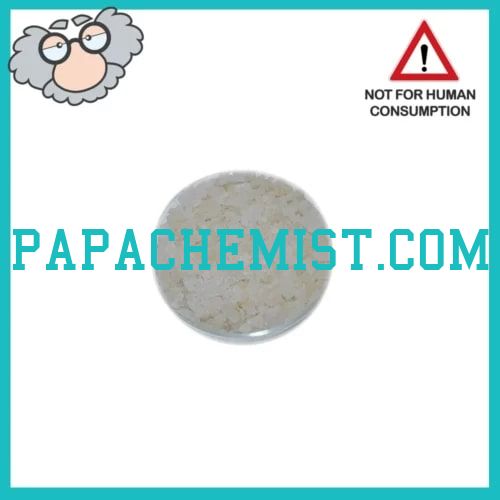DCK (Deschloroketamine) Arylcyclohexylamines
Stock: AVAILABLE [05/05/2025]
GET MORE BANG FOR YOR BUCK:
Pay Less, BUY MORE!
| 1 to 2 | EUR 39.95 /gram | Save 0% |
| 3 to 4 | EUR 35.96 /gram | Save 10% |
| 5 to 9 | EUR 31.96 /gram | Save 20% |
| 10 to 24 | EUR 25.97 /gram | Save 35% |
| 25 + | EUR 21.97 /gram | Save 45% |
Buy DCK (Deschloroketamine) Online
DCK, deschloroketamine is a substance that is only sold for research purposes and is therefore not intended for consumption.
DCK maintains its stability for up to 2 years when stored in the correct environment. DCK Is intended for research purposes and not for consumption. Therefore, it is important that the product is kept out of the reach of children and pets.
We offer good quality research chemicals for a fair price. Your order will be shipped every day within 24 hours. Therefore, order DCK safely and quickly via PAPACHEMIST.COM!
DCK properties
Synonym: 2′-oxo-PCM, deschloroketamine
CAS Number: 4631-27-0
Formula: 2-(methylamino)-2-phenyl-cyclohexanone
Molar mass: 239.7 g/mol
Purity: >97%
What is DCK?
DCK, also known as Deschloroketamine, is a synthetic dissociative substance belonging to the class of arylcyclohexylamine chemicals. It is a derivative of ketamine, a known anesthetic. DCK shares some structural similarities with ketamine, but has several properties that make it unique and intriguing to researchers.
DCK was first synthesized in the early 1970s, and since then it has attracted the attention of the scientific community for its potential applications in research. Its chemical structure and properties make it an interesting subject of research in the fields of pharmacology, neuroscience and medicinal chemistry.
Like other dissociative substances, DCK can induce a state of dissociation from the environment and alter sensory perception. It interacts with certain receptors in the brain, especially the NMDA (N-methyl-D-aspartate) receptors, which play a crucial role in regulating neuronal communication. By modulating the activity of these receptors, DCK can have a range of effects on perception, cognition and consciousness.
Researchers are particularly interested in studying DCK because of its potential therapeutic properties and its ability to provide unique insights into central nervous system function. It may have applications in investigating the mechanisms underlying various neurological and psychiatric disorders, and in developing new treatment methods.
The research on DCK aims to increase our understanding of its pharmacological profile, its potential therapeutic benefits and its potential risks or side effects. By studying the effects on neuronal functions and behavior, scientists can gain valuable insights into the complex interactions between chemicals and the brain.
How did DCK come about?
DCK, also known as deschloroketamine, is a synthetic chemical first synthesized by researchers in the early 1970s. It belongs to a class of compounds known as arylcyclohexylamines, which also includes other substances such as ketamine and PCP.
The development of DCK was driven by scientific curiosity and the desire to investigate the effects and properties of new compounds. Researchers looked for a chemical derivative of ketamine that would retain some of its pharmacological properties but at the same time exhibit unique properties.
Through a series of chemical modifications and experiments, the scientists were able to synthesize DCK and study its effects on the central nervous system. They were particularly interested in its potential as an anesthetic or painkiller, given its structural similarities to ketamine.
Over the years, DCK has gained recognition within the scientific community as a research tool for studying the brain and its functions. Its unique properties, such as its ability to induce dissociative effects, have made it an interesting topic in fields such as pharmacology, neuroscience and medicinal chemistry.
The synthesis and study of DCK contribute to our understanding of the complex interactions between chemicals and the brain. Scientists continue to investigate its pharmacological profile, possible therapeutic applications and possible risks or side effects. This ongoing research helps expand our knowledge of the central nervous system and paves the way for future discoveries in the field of neuroscience.
Hazard statements
DCK can cause respiratory irritation.
DCK can cause eye irritation.
Discharging research chemicals into the environment is prohibited.
DCK IN CONTACT WITH EYE: Rinse eyes gently with water for five minutes. Remove the contact lenses if possible
DCK IN CONTACT WITH SKIN: Wash skin with soap and water.
AFTER INHALATION OF DCK: Remove the victim to fresh air and keep the victim in a position that makes breathing easy.
Last stock update: May 2025 - Tags: buy online 2025, Buy DCK (Deschloroketamine) online with stealth shipping. Lizard Labs, Chems.eu, Professor.nl, buybestrc.com, Legit research chemicals vendor. Worldwide shipping with stealth parcel. EU stock. Sending to UK, USA, United Kingdom, Australia, New Zealand, France, Spain, Germany, United States, Sweden, Norway, Finland shipping, undetectable parcel, Buy research chemicals with Visa credit card Paypal bitcoin from Europe. order DCK (Deschloroketamine), DCK (Deschloroketamine). You can find out "how to buy DCK (Deschloroketamine) and other research chemicals online" on www.papachemist.com (formerly known as professor.nl)
Please read Terms & Conditions before making order.
Interested in Wholesale/Bulk order? Apply now
 USD
USD GBP
GBP CAD
CAD AUD
AUD